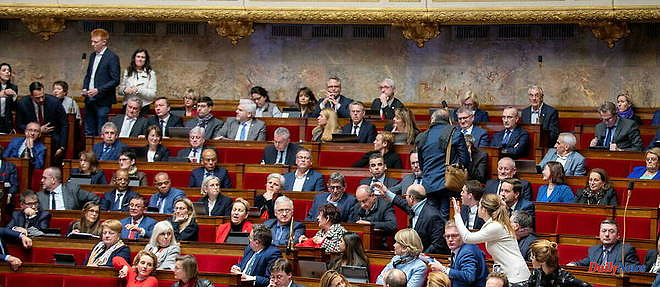Can you be elected and convicted for domestic violence? No, according to a bill brought by Aurore Bergé, president of the Renaissance group in the National Assembly, which must be debated from this Tuesday, March 7 in the hemicycle. The deputy of the presidential majority proposes to supplement a 2017 law which lists the offenses for which the conviction must be accompanied by a sentence of ineligibility of up to ten years.
It is difficult not to make the link with the Adrien Quatennens affair, the LFI deputy convicted of violence against his ex-companion and who has returned to the Assembly for a few weeks. Several parliamentarians, including within the majority, are crying out for the coup and calling for a step back. At Le Point, Aurore Bergé assumes to seize the news: the Quatennens affair should make it possible to open the debate on the subject. Interview.
Le Point: What does your bill contain?
Aurore Bergé: In 2017, we created a system with a mandatory additional penalty of ineligibility for people convicted of a certain number of offenses and crimes. The judge obviously remains the decision-maker, but he must justify his decision if he chooses not to apply this sentence. With my colleague Sacha Houlié, we have identified holes in the racket on the listed offences. This bill therefore completes it, with the addition of convictions for domestic violence, but not only: there is also violence against minors, homophobes, racists, against teachers, etc.
We are not going on the ground of morality. Nor will the law remove the mandate of people already elected, it is not retroactive. But we want to send a clear message to society: if we want to eradicate this type of violence, we cannot have elected representatives of the Republic condemned for the same reasons.
Your proposal comes just after the Adrien Quatennens case, the LFI deputy convicted of domestic violence who returned to the Assembly. Some of your colleagues accuse you of wanting to legislate out of emotion...
It is a text that we originally carried ourselves. We are doing the usual parliamentary work, that is to say, evaluating the law to see if it works well and if there are no holes in the racket. Obviously, we are not above ground, nor outside the news. We live with the gaze of society, which finds certain situations abnormal. To say that an elected official convicted of domestic violence can sit and vote on these subjects seems incongruous, even violent for the victims. We want elected officials who have a republican ethic.
In the opposition, but also in your own camp, your proposal is not unanimous...
It is necessary to know where one places the limit of the exemplarity of the elected officials of the Republic. Here, we are not creating a new device, we are completing one that has proven itself. We only rely on the conviction, because it is not up to us to judge the facts before the judge. There were sincere reservations from the MoDem group in committee, we finally lifted them and they voted. In the opposition, there are less sincere reservations...
Are opposition groups acting in bad faith?
The far right would like to reconsider the convictions for discrimination, already included in the law in force. They would therefore like us to go back… On the side of La France insoumise, I observe that they always have a propensity to express themselves strongly when it concerns others, less so when it is in their own party. This bill places them before their contradictions. Perhaps they have a personal blockage, but, in politics, we seek the general interest. The only question that arises is whether we want elected officials convicted of domestic violence, homophobic or racist to be able to represent themselves before the French.












